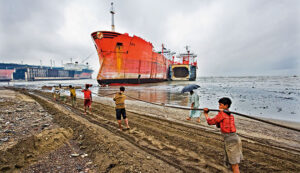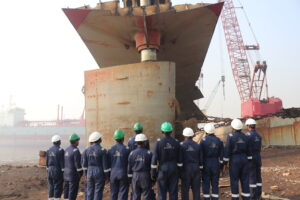- Leading ship recycling company and has been established in 1983
Hong Kong Convention for Ship Recycling
Hong Kong Convention for Ship Recycling– A plan that was implemented in the year 2009 has completely changed the functioning of shipbreaking companies by offering techniques that can help them save the environment. The activation of the convention was necessary as the recycling yards were using hazardous materials and following the old-age methods that combine loud sound machinery that generated the higher level of greenhouse gases. All this, when combined, turned out to be harmful and produced particles that populated the air and severely affected the health of laborers working on the ship recycling port. The establishment of the Hong Kong Convention for Ship Recycling has worked in the favor of nature and helped it preserve. Over the years of time now with the successful implementation, the ship workers, ship recycling owners, and ship stalk holders all are equally concerned for the motive of protection of the environment.
Adoption of the Hong Kong Convention for Ship Recycling
The adoption of the Hong Kong Convention took place in the year 2009, May at Diplomatic Conference in Hong Kong. The primary motive of the convention of ship recycling was to control the spread of Transboundary Movements of Hazardous Wastes and their Disposal too. The criteria of it were suggested by some of the nongovernmental organizations and the IMO Member States. The ramifications of the convention were considered the best one in order to support the health issue of the labor workers. Plenty of organizations took place in the situation and demands the safety of the environment which eventually get noticed and people soon adopted the Hong Kong Convention for Ship Recycling.

The Agreement Made by Hong Kong International Convention for the Safe and Sound Environment.
The decision of the Hong Kong Convention for Ship Recycling was a very sensitive topic and it only took place with a deep search and discussions too. There was an agreement that was signed by each ship-breaking company owner which sets the compulsion implementation of the resource. There were several articles in the convention which have been described below.
Article 1 – General Obligations
- Each party must fulfill the criteria suggested and needed to look after the process of the safety of human health by preventing serious injuries, and adverse effects on the environment and the humans too.
- One must not cause any hurdle in the process of the implementation of the convention and take the advice of protecting the environment very seriously.
- The party needs to provide their respective concert and accept the implementation of the Hong Kong Convention.
- The parties must always use improvised technology machinery in order to save the planet.
- Until further changes, one needs to follow the ones which are deeply suggested.
Article 2- Definition of the Elements
- “Convention” – Hong Kong International Convention for the Safe and
Environmentally Sound Recycling of Ships, 2009. - “Authority” – The government that provides the authority for legalizing the shipbreaking company.
- “Organization” – International Maritime Organization.
- “Committee” – Marine Environment Protection Committee of the Organization.
- “Ship” – It means Vessels of any type and any weight.
- “Hazardous Material” – Any material that is harmful to human health and the environment.
- “Ship Recycling” – This means any material that can be reused and recovered with care.
- “Ship Recycling Facility” – It is used for the ship recycling yard.
- “Recycling Company” – That deals in the process of ship breaking and ship recycling procedures.
Article 3- Applications
- The ship owners must be registered under the law of their state government.
- The process has to be followed with the procedure mentioned in the jurisdiction.
- Hong Kong Convention for Ship Recycling is not for vessels less than 500 GT
Article 4 – Controls of Ship
- Each party must follow the rule and regulations of the Hong Kong Convention for Ship Recycling.
- The processes performed must be under the consultation of the team of the convention.
Article 5 – Survey and Certification of Ships
- Each party must take the measure of taking the certification from the losing authority and should fly its flag only after the survey is conducted by the authorities.
Article 6 – Authorization of Recycling Facilities
- It is compulsory for the parties to associate with the authorities and follow the recycling measures as suggested under the Convention Article 3.2.
Article 7 – Exchange of Information
- Hong Kong Convention for Ship Recycling states that that party must provide an organization as the medium to exchange the relevant information that has been asked by the authorities. This strictly has to be done under the control of time important in a smooth and effective manner.
Article 8 – Inspection of the Ship
- Hong Kong Convention for Ship Recycling units can anytime send their officers for the check of the certifications that are relevant as per the norm of Internation Inventory Hazardous Management.
- If the certification is inappropriate, legal action can be taken on behalf of the owner.
Article 9 – Detections of Violations
- The party must corporate with the authorities of the Hong Kong Convention.
- If the investigation process is stated, then it is essential that the owner must offer the asked information in a harmful manner.
- Each and every condition has to be accepted by the Party.
- If there is a detection of violation. The action by the official of the International Hong Kong Convention for Ship Recycling, 2009 will take place.
Article 10 – Violation
The Parties sometimes violate the laws to save a few amounts of money hence under this article if any violation is detected, the case is sent to the national law organization for verification purposes.
Article 11 – Undue Delay of Detention of Ships
Among the Articles 8,9,10 if any party is found guilty shall face compensation and suffer the loss until further notice by the legal authorities of the Hong Kong Convention for Ship Recycling and the national unit.

Article 12 – Communication of Information
It is necessary for each party to report to the organization and transfer the information listed below.
- The authorization and the jurisdiction details.
- Contact details of the party and the competent authorities too.
- The authorized surveyors and authorities that are linked with the party.
- List of the recycling certification and the number of flags fly per year.
Article 13 – Technical Assistance and Co-operation
- Parties must provide assistance to the personnel and work in a safe and sound environment. Hong Kong Convention for Ship Recycling provides support to parties who ask for assistance in the following way.
- To train them.
- Helps them with the knowledge of technology, assistance, and facilities.
- Helps with the provision of joint research and development programs.
Parties must corporate with the policies, national law, and the rules and regulations too.
Article 14 – Dispute Settlement
Parties must solve disputes with safe and peaceful behaviors which may include the inquiry and judicial settlement. arbitration, and negotiation with Hong Kong Convention for Ship Recycling
Article 15 Relationship with National Law and International Agreements
- Hong Kong Convention for Ship Recycling will not interfere with the rules and regulations made by the United Nations Convention on the Law of the Sea, 1982, and international law of the sea too.
- The convention will not prejudice the laws of the internal committees.
Article 16 – Signature, ratification, acceptance, approval, and accession
The Hong Kong Convention for Ship Recycling will be open for the state to become parties with a mandatory signature from 1 September 2009 till 31 August 2010.
Any state can become the party by providing the signature on the agreement.
If the state holds 2 or more units under it, that at the time of signature, ratification, acceptance, approval, or accession convention may extern the declaration or may only provide an approach to one with the proper documentation.
Article 17 – Entry into Force
- Convention for Ship Recycling must enter into force within the time period of 24 months from the date of issue.
- It is a compulsion that no less than 15 States must sign it without reservation as to ratification, acceptance, or approval or have deposited the requisite instrument of acceptance, approval, ratification, or accession as per Article 16.
- With the whole deposit of ratification, accession, approval, or acceptance, Convention may enter into force by three months from the date of entry.
Article 18 – Amendments
The amendment in the Hong Kong Convention for Ship Recycling will accept the amendment only when,
- The parties submitted the amendment to the Secretary-General.
- The proposed amendments must be processed with a proper procedure.
- The parties must attain the two third of the majority votes to seek the amendments.
- If the amendment is processed by the conference and the parties decline to accept it, it then shall be unlisted from the list of legal parties.
Article 19 – Denunciation
- With the expiry date of 2 years, the convention for the party will be denounced.
- The denunciation will only be processed with the acceptance of the secretary general.
Article 20 – Depositary
- The deposit of the certification of the parties has to be with the secretary general.
- The signature deposits and the other documents about the parties namely approval ratification, accession, or acceptance need to be deposited with the Convention by Secretary General.
- Another document also requires the deposit such as the date of entry into the force.
Article 21 – Languages
Hong Kong Convention for Ship Recycling is only done and accepted in the languages mentioned.
- French
- Arabic
- Spanish
- Chinese
- Russian
- English
Each language is given an equal priority.
A Thoughtful Concern of the Convention
The major concern that Hong Kong Convention took place was the various factors that it noticed are troubling the environment. A proper thought process was taken in mind to look after the issues and then accordingly with the expert’s advice, the policies were made and suggestions were put in for advisory purposes.
- The Targeted Concerns-
- Protection of environment
- Evolution of machinery
- Solar system to generate electricity
- Management of hazardous waste
- Safety of workers and their health issues
- Methods of recycling
Conclusion
The overall result of the Hong Kong Convention for Ship Recycling was to obtain the attention of the shipbreaking company owners and awards them for the concern and importance of the environment and its worker’s health too. This was a move by the international authorities to the conservation and the preservation of the atmosphere in which they succeeded well. Now safety has been a priority and at R.L. Kalthia we are always concerned about the health of workers and the protection of nature hence we follow each and every guideline of the convention and are legally authorized to.